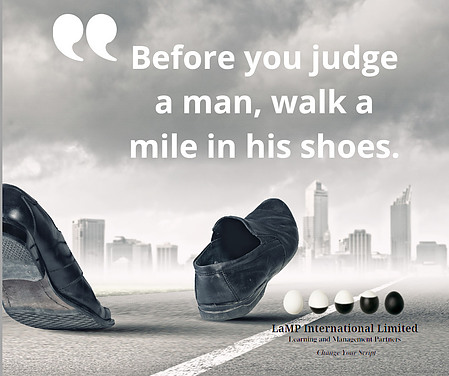Passive people have a hard time being assertive primarily because of fear, guilt or not wanting others to be uncomfortable. It is challenging to step outside of your comfort zone and rock the boat. Most people are fearful that the boost will overturn and they will drown in the backlash.
Over the years, I have worked with thousands of people who wanted to learn how to transform their behaviours from passive to assertive. There was always a common thread – it was, more often than not, an extremely challenging journey of behavioural change.
However, for those who found the courage to steer the course, there was no going back.
Life In The Passive Lane
In my early years, I survived – barely – in the passive lane of life. As an only child growing up with my grandmother, I had to watch my cousins live colourful and active lives with their families. My grandmother was away a lot, working hard to provide for us. My parents were absent from my life in those early years.
My sense of belonging and self-esteem was low. There was no one to give the nurturing that I needed as a child. Looking back now, I practically raised myself.
That period pushed me into the passive lane. I retreated into myself, never learned how to trust and struggled to discover my self-worth. All my emotions, thoughts and feelings were locked away.
I never felt important or worthy. This stayed with me throughout my school years and my early career. It shaped the way I connected (or didn’t) with others and the friendships I formed. I rarely let anyone “in” making it difficult to communicate with or understand me.
The Struggle To Change Lanes
No change comes easily. I actually like to say that “change is violent” perhaps passively so. You do not see what takes place internally when someone is going through change. Passive behaviour is one of the best containers of the truth.
The thing is though when those behaviours are bottled up and left to fester and build, they create forceful energy that usually results in the lid being blown off at times. The explosion could cause irreparable damage.
Passive people have a high tendency to swing the pendulum from passive to aggressive, totally missing the assertive arena.
– Cassandra Patrovani
With low self-esteem, the fear of non-acceptance and not wanting to cause conflict it feels much easier for passive people to avoid situations that require them to adapt or change their behaviour altogether.
That takes a lot of work and interaction.
The Root Cause Of The Struggle
Now that you understand what the struggle is like being passive, let’s look at some of the root causes. Again, I will refer to my own experiences and the work I continue to do with people around the world.
This is in no way exhaustive. The intention is to provide a few reference points to increase your awareness.
A. LOW SELF-ESTEEM
This ranks the highest. I recall my path of discovery to confront my low self-esteem. At the time, I was a successful mid-career Manager but had a lot of difficulties working with some of my Direct Reports. Most of them were older than me and very firm in their thoughts and behaviours.
Getting them to change was an uphill battle. I always avoided confronting them, especially when they became rude or raised their voices. I felt intimidated and retreated.
I would leave the office and vent with a close friend but never address them or the issues.
Then I learned that this was connected to my own upbringing and my feelings of self-worth. The abandonment I experienced as a child was preventing me from standing tall and strong and performing with assertiveness and authority.
B. FEAR OF NON-ACCEPTANCE
Being afraid of not being liked or welcomed is another reason why passive people have a hard time being assertive. This fear resides in the root cause(s) of low self-esteem.
I recall a Manager sharing with me how deep his fear of non-acceptance was. Most of his peers were members of a sports club. He never played sports because, as a child, his father was abusive and never allowed him to play.
He always made excuses when “the boys” were going to play football, basketball or some other sport. The fear that they would reject him because of what he described as a weakness was real and alive for him.
With the rise of Social Media, passive people find it even more difficult to be seen and heard.
C. AVOIDING CONFLICT
This combines A. and B. Think about it.
If your self-esteem is low and you are fearful of not being accepted, getting into a situation of disagreement with someone will not be a choice you want to make, will it?
Of course not!
To passive people, almost everyone else is intimidating. They would prefer to keep the peace rather than stand up – worse yet, fight – for a belief, cause or themselves. Showing that they have a different opinion, needs or wants could result in even less acceptance.
That is not a risk that they will be willing to take.
D. (DIS)STRESS
There is good stress (eustress) and bad stress (dis-stress). People with primarily passive behaviour, just like those with aggressive behaviour, do not manage (dis)stress well. They do not simply retreat, they lock themselves away under a hard shell just like a turtle or tortoise.
Getting them to resurface can be painful for everyone. But then, who likes (dis)stress?
How Can A Passive Person Become Assertive?
There are hundreds of different ways – tools, coaching, workshops, therapies – available to support your transition from being passive to being assertive. I will share what worked for me and the primary mode; I use with my Clients.
STEP 1: JOURNALING
I cringe sometimes when I read through my old journals. I have come a looonnnggggg way, baby!!! Journalling helps me to put things into perspective and to acknowledge my own thoughts, feelings and words. It has helped me to live a more authentic life and to be more congruent.
Through my jottings and writings in my journal, I was able to become more self-aware and better structure the “me” I wanted to become. That included becoming more assertive.
When a situation occurred that I was not pleased about, I used my journal to stage different behaviours and outcomes. Journalling helped me to change my script.
B. ROLE TRAINING
There is a technique in Psychodrama that was adapted for behavioural training. It is called Role Reversal. This classic saying sums it up:
Role Reversal teaches you empathy and this is one of the first lessons a passive person needs to learn – to be empathetic towards him/herself. To be kind and understand the genesis of their behaviours.
It is also an effective way to bring your journal to life. Use what you have written to practice a different script. Play it out and start to feel what gives you satisfaction and lifts your self-worth.
C. TALK IT OUT
It may seem like a long journey to get to this point. I did not get here until I was in my 30s. But, having arrived, I did the work that was necessary through the support of my Dutch Psychotherapist living in New Zealand.
Talking helped me come to terms with the foundational issues that carried me to into the passive lane. Although I struggled through the early sessions, I soon began to enjoy them as I experienced a new person evolving.
There was also a change in my work and what I contributed to my organisations and relationships. I learned how to communicate effectively and constructively.
I became more assertive with my behaviours.
Closing Thoughts . . .
I think most people have a hard time being assertive sometimes in their lives, not only people who are passive. Even those of us who are very self-aware and confident struggle in certain situations.
When your confidence is low, fear creeps in. It becomes difficult to stand up, speak up and be assertive. You worry about people not accepting you and their negative reactions towards you.
It is possible to change your script, however.
With concerted and consistent effort and interventions stepping out of the passive lane can contribute to greater self-esteem and more success.
About The Author
Cassandra is an internationally experienced and qualified HR, OD and OB professional. She founded LaMP International Limited in the late 90s in New Zealand. The company has grown from strength to strength since then and today provides learning, management, coaching, change and development initiatives to companies and individuals around the world.
Most of the work is done virtually.
This allows her to travel the world with her pre-teen daughter, enjoying music, dance, and life while exploring cultures and tracing their Trini roots.


